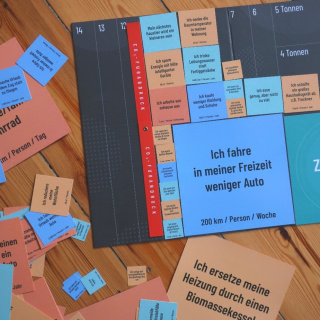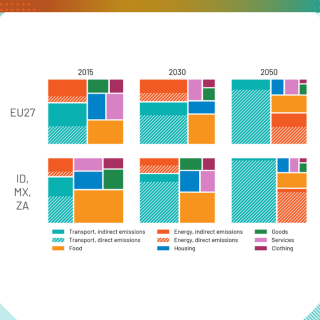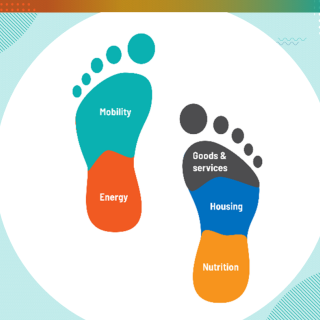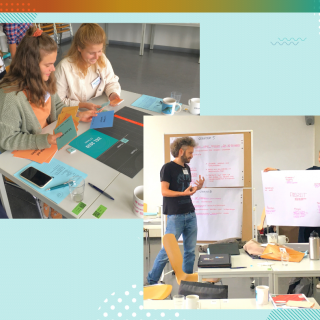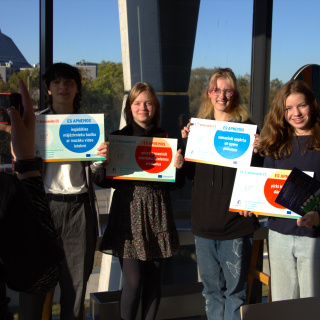Blog
Exploring the Potential Impacts of Lifestyle Changes on Economic and Welfare Systems
In an effort to assess the potential effects of lifestyle changes on economic and welfare systems, a Policy Delphi process was carried out in several European countries. This innovative approach gathered expert opinions through a series of workshops, aiming to evaluate the feasibility and desirability of welfare system policies and business models that align with 1.5-degree lifestyles. In this blog post, we will delve into the methodology, key…
Where do you want to spend your carbon budget?
There is more and more talk about carbon budgets in climate policy, but when it comes to business and lifestyles, this is not yet the case. Decisions as individuals and businesses are still made mostly based on resources such as money and time. When we measure environmental impacts, such as carbon footprints, we focus on what has already happened and what we might be able to learn from it. Why not flip the question and start talking from a carbon…
Adopting a sustainable lifestyle: lessons from the brave
Living a sustainable life is not a walk in the park. It is a complex process for governments, organisations and individuals alike and has many ups and downs. It is sometimes hard to know exactly which of our choices are truly sustainable. Also, we often face difficulties when trying to adopt a sustainable way of life. Some people experience such changes more actively with such changes and we can learn a lot from them: what motivates their…
1.5 ° Lifestyle options discussed by more than 100 citizens in 5 European countries – which lifestyle changes were acceptable for our lab participants?
During our Citizen Thinking Labs (CTLs) we exposed more than 100 citizens from 5 European countries to a set of low-carbon lifestyle options to evaluate A) whether they were already implementing them, would be willing to implement them in the near future, or would reject the options, and, B) what the reasons for their choices were.
Walking the talk: small(er) footprint project events to extend our impact
Just this year (in 2023), the EU 1.5° Lifestyles project team will organise close to 20 project events: various thinking labs, Delphi workshops, a European stakeholder workshop, etc., in different countries, involving altogether quite a few people. Therefore, our impact can be big, not just in terms of what we talk about at the events, but also related to how the events are organised and how their delivery and logistics influence our participants…
What if, by changing our lives, we kept 1.5° alive?
The window for effective action is small and rapidly closing - we need a renewed and growing sense of urgency, to "keep 1.5° alive".
Emissions overshoots against 1.5° climate targets in 2030 and 2050
Countries, companies and other coalitions are setting climate goals to reduce greenhouse gas (GHG) emissions to ‘net zero’ or limiting them to a 1.5° compatible level as set by the Paris Agreement. Individuals may wonder about their contributions to these climate goals. Can an average EU resident achieve a 1.5° lifestyle… without making lifestyle changes?
What's in a footprint?
Many people have heard of a carbon footprint. Maybe they have taken one of the many online tools to calculate their own or have seen it calculated for a product they were buying. Maybe some are sceptical because they have read that oil companies were behind its development to place the responsibility for reducing emissions on individuals. But what is a carbon footprint really, how do we go about calculating it, and how can it be useful in…
Are you 1.5ing yet? – A Student Thinking Lab on climate-friendly lifestyles
On September 15th 2022, three students from the University of Münster co-organised a “Student Thinking Lab” dealing with 1.5° lifestyles, as part of their studies. The workshop was aimed at students from different higher educational facilities and fields of study in the area around Münster. It focused on sharing information about sustainable lifestyles and discussing structural barriers to sustainable lifestyles (and how to overcome them)…
Gamifying EU 1.5° Lifestyles in the 17th Annual Researchers’ Night
We as a society in Latvia are poorly concerned about climate (European Commission, May – June 2022), and also, we often are reluctant to participate in discussions and connect climate change reduction initiatives to our lifestyles. This is the reason why we – Green Liberty team – prefer to use gamification as a technique to gain increased attention of society to urgent global issues, including climate lifestyles. The gaming elements that we use…





